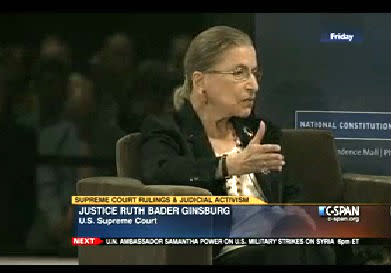Video: Justice Ginsburg on her Supreme Court legacy
Justice Ruth Bader Ginsburg talked with the National Constitution Center’s Jeffrey Rosen about one of her famous dissents as a part of her legacy, and a few upcoming Supreme Court cases, during her recent appearance in Philadelphia.
When asked by Rosen about her legacy, Ginsburg pointed out the that the Court would quickly be taking up another round of important cases in about one month.
“Think about what’s coming up next term. In the very first sitting we have campaign finance- it is permissible to put a limit on contributions- and that’s in the first week. In the second week, we have another affirmative action case. We have recess appointments, and that has been going on since George Washington,” she said.
On her dissents, Ginsburg said sometimes Congress is a valuable partner in creating a legacy.
Related Videos: Justice Ruth Bader Ginsburg talks about judicial activism | Ginsburg explains Stone as inspiration for Fisher dissent | Justice Ginsburg on DOMA and Roe v. Wade
“Sometimes Congress is very helpful. There is the difference between a case that is a constitutional interpretation where the Court says this is what the Constitution means … until the Court overrules its decision or there is a constitutional amendment.”
In other cases, like Title VII of the Civil Right Act, Ginsburg said that “when you’re dealing with statutes … if the Court gets it wrong Congress can fix it.”
One of her most satisfying dissenting opinions was in the Lilly Ledbetter case, which was about equal pay for women and a Title VII discrimination claim.
“My dissent said essentially, ‘Congress, you’ve really misunderstood what you meant. So make it even clearer’ – which the Congress did inside of two years,” she said.
“My dissent described what every woman of Lilly’s generation knew: that if you are the first woman in a field occupied by men, you don’t want to be known as a complainer, don’t want to rock the boat, don’t want to be seen as a troublemaker. But there comes a point when the discrimination is staring at you in the face and you have to make a stand.”
Ginsburg said a key point was a time statute that limited lawsuits.
“The idea that the dissent put forward was that every pay check that this woman receives is renewing the discrimination. So she can sue within 180 days and she will be on time. And Congress said, ‘yes, that’s what we meant.”
“The Constitution is something else. The Court time and again has seen that it has made mistakes and it’s corrected them,” she said.
Ginsburg also pointed to the Sally Reed case, as part of her legacy. She wrote the Reed brief in 1971 as an attorney in the landmark Supreme Court case that heightened scrutiny in court review of sexually discriminating laws.
Recent Constitution Daily Stories
Justice Ruth Bader Ginsburg talks about judicial activism
Video: Ginsburg explains Stone as inspiration for Fisher dissent
Video: Justice Ginsburg on DOMA and Roe v. Wade
Is this President Obama’s “Eisenhower moment”?
Vote Now: An amendment to ban desecration of the American flag



